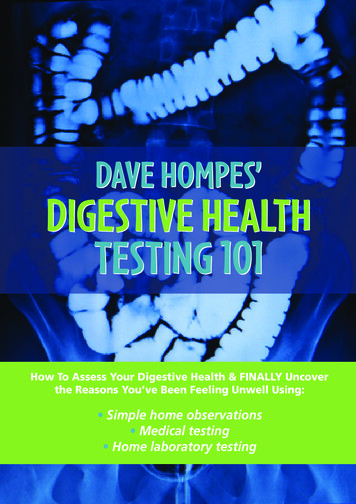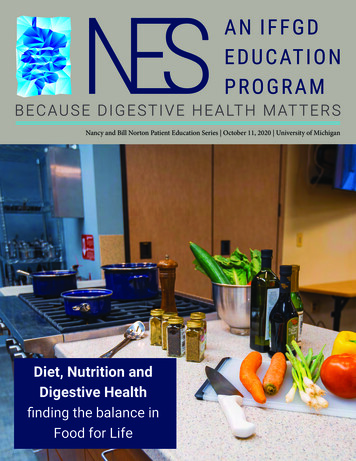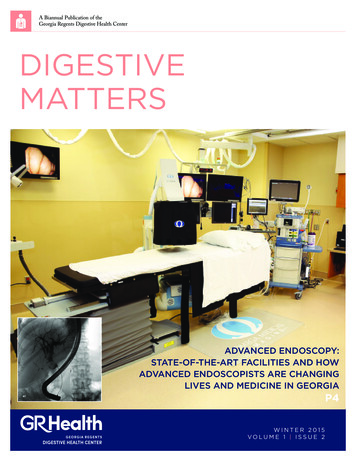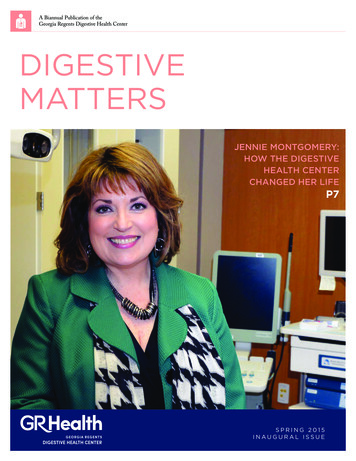
Transcription
DAVE HOMPES’DIGESTIVE HEALTHTESTING 101How To Assess Your Digestive Health & FINALLY Uncoverthe Reasons You’ve Been Feeling Unwell Using: Simple home observations Medical testing Home laboratory testing
2
INTRODUCTIONHi, and welcome to this short e-book. My name isDave Hompes and I’m here to be of service.For the last seven years I’ve been helping people fromaround the world figure out why they’ve been feelingunwell using powerful, cutting-edge laboratory tests andnatural programs.Reading this short e-book could change your life.Over the next few pages, you’re going to learn how to use a range of diagnostictools to perform a detailed assessment of your digestive health.We’ll cover the pros and cons of conventional medical tests and simple home testsyou can do at home with very little equipment.Importantly, we’ll also discuss advanced digestive testing tools that aren’t typicallyavailable at your doctor or gastro specialist’s office.I’m also going to show you how you can tap into technology that enables you togain enormous and valuable insights into your digestive health using tests thatperhaps, until now, you weren’t aware of.Since 2007 we have run more than 2,500 of these tests with clients from23 different countries. The tests are convenient, non-invasive and check for thingsyour doctor simply will not consider.After reading this short document, you’ll be fully armed with all the informationyou need to finally understand what’s been making your digestive system feeluncomfortable.In turn, you’ll be able to overcome symptoms like irritable bowels, bloating,heartburn and acid reflux, gas, belching and possibly even inflammatory boweldisorders like colitis and Crohn’s disease.3
CONTENTSIntroduction.3Why we love what we do.5Why I want to teach you about digestive testing.6Why bother testing your digestive health.9How your gut sustains damage.13Your second brain.15Your gut’s own immune system.16How inadequate digestive secretions cause problems.19The Microbiome - your “good bugs”.21How stress affects your gut.25Digestive disorders and body-wide problems.27Medical testing for digestive health.31Medical testing for food reactivity and microbes.37Medical testing for digestive secretions.40Medical testing summary.42Simple home tests for digestive health.43Simple observations for checking bad guys: Candida,bacteria and parasites.50A summary of simple home tests.52Manual therapy.53Cutting edge lab tests you can do at home.55OK, but what do the stool test markers actually mean?.64Other helpful home and digestive tests.74Digestive screening summary.79My personal digestive testing recommendations.81Order a test, case review and consultation today.834
WHY WE LOVE DOINGWHAT WE DOI hope my story inspires you In 2007 I felt truly awful: I had severe heartburn, bloating, abdominal pain andloose stools. My skin was dry. I had dandruff and fungal toenails. My moods werelow and I had no energy. My sex drive had also dropped through the floor.One simple home stool test through a private laboratory changed all that. Thetest uncovered an H. pylori infection in my stomach, an intestinal parasite calledBlastocystis hominis and a fungal overgrowth called Aspergillus.When I took steps to get rid of these “bad bugs”, my symptoms improveddramatically over a short space of time. When I say short space of time, mysymptoms improved by a good 80-90% in less than 90 days.I was so excited by my transformation that I decided to take extensive training infunctional medicine so I could assist others achieve the same results.Over the last seven years I’ve witnessed time and again how simple, home-baseddigestive screening, can change lives for the better by precisely determining thereasons why folk have symptoms.I’ve also developed the Hompes Method Practitioner Training program in whichI teach nutritionists, MDs, PTs, osteopaths, chiropractors and others how to usethese “functional digestive tests” to achieve superlative results with their ownclients and patients.5
WHY I WANT TO TEACH YOUABOUT DIGESTIVE TESTINGIt was a Thursday morning. My office received a stool test result for one of ourclients, Mrs. R. Her stool test – shown in the screenshot below - revealed that shehad the following imbalances in her digestive tract:33333H. pylori (both CagA and VacA virulent strains)E. coli O157Shiga toxin E. coli gene Stx 2Blastocystis hominis parasiteAspergillus fungal overgrowthThe test also detected:3 A high anti-gliadin sIgA level (evidence of gluten intolerance)3 High calprotectin (indicating upper digestive tract inflammation)3 High levels of fecal fat (indicating an inability to digest fats due to lowstomach acid, and sluggish pancreas and gallbladder activity)3 Very high sIgA1 and sIgA2 levels (indicating an over-active gut immunesystem)Finally, the test showed that bacteria detected in Mrs. R’s stool sample containedseveral antibiotic resistance genes, meaning that certain antibiotics would not behelpful in treating the “bad bugs” detected by the lab6
Somewhat ironically, my client’s husband is a medical doctor – a GP. He was gobsmacked by the detail provided in the test and paid me to hold a 60-minuteconsultation to explain the test results and discuss the best course of action forhis wife.This was magnificent – a medically trained doctor openly discussing the situationwith “holistically trained” practitioner to ensure the best course of action foranother human being!If only this could happen more often!7
What’s My Point?My point is this: The lab testing detailed in the screenshot is the real deal and I’mbusting at the gut (excuse the pun) to help you understand how it can benefityou.It has the ability to uncover hidden reasons for chronic digestive symptoms andprovides enormous clues as to why folk feel tired, anxious, grumpy, achy, unsexy,and deprived of sleep.Over the last seven years I’ve witnessed time and again how simple, home-baseddigestive screening can change lives for the better by precisely determining theprecise reasons why symptoms have developed.In fact, I’ve interpreted thousands of these lab tests and my staff and I have adeep, deep yearning to help you solve the riddle of why you’re not feeling well.As a matter of course, I run at least one stool test a year to check my digestivesystem. It’s not the only test I run each year, but it sure is one of the most important.Once you’ve read this e-book, you’ll see exactly why I go out of my way to checkmy digestion on a regular basis, and why I encourage you and everyone else todo the same.Believe it or not, you have access to home testing technology that is U.S. FDAapproved, and is undergoing trials with the England and Wales NHS.Your doctor probably won’t know about this technology yet, but it’s readilyavailable for you to take advantage of right now.8
WHY BOTHER TESTING YOURDIGESTIVE HEALTH?You might wonder why you’d bother running a test to check your digestive health.I mean, what’s all the fuss about?Well, consider that your digestive system has the ability to either build or destroyhealth in the rest of your body.When your digestive system isn’t working properly, you may have digestivesymptoms such as:3 Nausea – feeling dizzy, yukky with a realization it’s coming from your gut.3 Heartburn – mild or even severe chest pains, almost like there’s a flamethrower in your.3 Acid reflux – burning sensations in your upper chest and throat, like there’ssomeone pouring acid in there.3 Bloating – like someone’s inflated a balloon in the middle of your tummyand you now look 8 months pregnant for no apparent reason.3 Abdominal pain – could be dull aches or nasty, stabbing cramps that creaseyou over.3 Irritable bowels – a mixture of all these symptoms and a feeling like yourgut is rolling around like a washing machine3 Wind – embarrassing gas shooting forth and possibly stinking the roomout.3 Diarrhea – nasty, loose stools that may explode from your rear end, looklight brown, green or greasy, and make your family or workmates gasp forair if they follow you into the bathroom.3 Constipation – inability or straining to go to the toilet once per day,or lots of pellet-like stools that are hard and painful to pass.9
Because you’re reading this e-book, my hunch is that you’re probably experiencingone or more of these digestive symptoms.You probable know intuitively that your symptoms didn’t just happen accidentally,and that there’s a reason for them.Unfortunately, the western medical system doesn’t really do as much as it couldto help you uncover the reasons for ongoing digestive symptoms, which I knowcan be very frustrating.When your digestive system is under par, you might also find that you feel unwellin other parts of your body.In fact, a take home point I’d love you to take away from this short e-book is thatyour digestive system can affect any and all other areas of your body. When it’snot working you can also have:3 Low energy or roller coaster energy levels3 Panic, anxiety or irritability and depression3 Fuzzy thinking and brain fog3 Memory problems3 Headaches3 Aches and pains, including arthritis and headaches3 Skin rashes and eruptions – dermatitis, spots, rosacea, etc.3 Trouble sleeping – getting to sleep or staying there3 Low sex drive (also erectile dysfunction in men)3 Menstrual problems3 Urinary tract infections – painful burning urination, discharge,3urgency and so onWeight gain or loss – this can often come from a faulty gutThe Confusing Part Believe it or not, you can have a damaged digestive system without developingobvious digestive symptoms.In other words, the absence of digestive symptoms doesn’t necessarily mean yourdigestive system is healthy.I realize this is confusing, but it’s the truth according to a massive body of scientificresearch and my own personal experience.10
When I got rid of H. pylori and the other bad bugs in my gut, I suddenly had moreenergy, better moods, improved skin tone and vastly improved sleep.Most crucially as a 32-year old man, my sex drive came back!At first, I wondered if I was just lucky, but time and again my students and Iwitness remarkable improvements in a range of symptoms when our clients rundigestive screening and address the findings.It’s not far fetched for you to expect similar results, namely:3333333Improved energy levelsBetter moodsBrighter skinSounder sleepA more active sex lifeNo more aches and painsResolution in your digestive symptomsBut to achieve these improvements and rejuvenate your health, you need to findout what’s causing your symptoms in the first place.11
12
HOW YOUR GUT SUSTAINS DAMAGEBefore we look at specific ways you can test your digestive health, I’d like to teachyou how and why your digestive system becomes damaged in the first place.Once you know why your gut starts playing up, you’ll be able to see why testingmethods have specific advantages and disadvantages.Your digestive system is complex and delicate. It can withstand a certain level ofassault, but it isn’t designed to endure the amount of stress and strain it’s exposedto from modern diets and lifestyles.Bad FoodsCertain food items, which I call bad foods, can damage your digestion. Theyinclude:3333333Gluten found in many grains and grain-based foodsProcessed cow’s milkSoyProcessed sugarProcessed foods in generalVegetable oils and margarinesAlcoholMany people consume these foods in large quantities. If you’re consuming thesefoods frequently, it’s wise to consider minimizing them. Your health and vitalitymay depend on it.13
Bad Bugs“Bad bugs” is my blanket term for all the little critters that can either overgrow orinfect your digestive system. They include:3333BacteriaParasitesYeast and fungal organismsVirusesBad bugs are incredibly common, but unless you have severe diarrhea and vomitingfor more than a few days, it’s unlikely your doctor will test for them.Despite overwhelming scientific evidence, chronic digestive infections are simplynot considered by medical doctors in situations where you have low-level ongoingsymptoms.This baffles me because in my experience, bad bugs are one of the main reasonswhy folk don’t feel well.Bad ToxinsFood additives, environmental chemicals and the toxins produced by bad bugscan all interfere with digestive function.These chemicals can create an immune response in your digestive system leadingto inflammation, damage and all the hallmark digestive symptoms.If I could sum it all up in one simple diagram, it would be Hompes Method Seesaw,below:14
YOUR SECOND BRAINMichael Gershon M.D. wrote a superb book called “The Second Brain”, in whichhe described something called the enteric nervous system, or ENS.The ENS is the nervous system in your gut. It is as complex as the nerve networkin your spinal cord and it makes more serotonin, dopamine and melatonin thanyour brain – much more, in fact.These “feel good” mood chemicals and relaxing, sleep-enhancing chemicals arevery important for your overall health. But if your gut is damaged, these chemicalscan fall out of balance.Bad foods, bad bugs and bad toxins can damage the delicate nerve endings inyour gut and also impede the production of hormones and important feel goodchemicals.This is one of the main reasons so many people with digestive problems feel tired,lethargic, depressed and anxious.There’s so much scientific evidence showing the links between gut, mood andbehavior it’s just not funny. Dr. David Perlmutter’s book, “Brain Maker”, is a worthyread in this regard.15
YOUR GUT’S OWNIMMUNE SYSTEMDepending on which article or book you read, scientists suggest that between 60to 80 percent of your entire immune system is found in your digestive tract.Bad foods, bad bugs and bad toxins can cause an ongoing immune responseinvolving inflammation. This response can cause digestive symptoms.Inflammation caused by an immune response in your gut can also spill over toother areas of your body and cause symptoms virtually anywhere.Inflammation in the digestive system is now associated in the scientific ionBehavioural changesMemory problemsLack of focus, clarity and mental acuityAutoimmune diseases like lupus, fibromyalgia and rheumatoid arthritisObesityDiabetes (type I and type II)High blood pressureHeart diseasePossibly even neurological diseases like Alzheimer’s and Parkinson’sPossibly even cancerAlas, despite all this research, most medical doctors are still not aware of theoverarching importance of gut health in these diseases.Any disease that involves alterations in your gut microbes and gut immune systemhas the potential to trigger immune responses elsewhere in your body.Even frequent colds and flu can be due to problems with your gut immune system.16
What Is Leaky Gut Syndrome?Your stomach and intestines are protected from the outside world by mucus anda thin layer of cells called the mucosal barrier.The mucosal barrier is a single layer of cells packed tightly together to preventthings leaking through into your bloodstream.Under normal circumstances, the barrier remains strong because cells are heldtogether by structures called “tight junctions”.But irritation and inflammation from bad food, bad bugs and bad toxins can leadto widening of the tight junctions, as seen in the diagram, below.[Special thanks to Dr. Josh Axe at DrAxe.com for the diagram]As these gaps increase in size, particles such as undigested food, toxins, bacteria,fungi and others can leak through your gut wall and into your bloodstream.This phenomenon is known by doctors as increased intestinal permeability or bythe layperson as leaky gut.17
As your intestine becomes more and more leaky due to bad foods, bad bugs andtoxins, more unwanted debris leaks into your blood.Your liver gets overwhelmed and can’t cleanse your blood properly, leading to asituation in which lots of unwanted particles enter general circulation.These particles can get lodged in your tissues or aggravate your immune system,causing an inflammatory response that leads to body wide symptoms such asallergies, aches and pains, brain fog, low energy, bad moods and sleep problems.18
HOW INADEQUATE DIGESTIVESECRETIONS CAUSE PROBLEMSIn order to do its job properly, your digestive system needs ample stomach acid,pancreatic enzymes, bile and other important secretions.A lot of different symptoms can develop when levels of these important andhugely beneficial substances drop too low.Stomach AcidStomach acid is essential for protein and fat digestion and is needed to breakchemical bonds so that vitamins and minerals can be absorbed into your body.A healthy acid level also stops bad bugs such as bacteria, parasites and Candidafrom entering or overgrowing in your intestine.Stomach acid levels decline with age – something that has been amply demonstratedby studies.Low stomach acid is associated with reduced digestion of vitamin B12, folic acid,iron, zinc and magnesium amongst other nutrients. Low nutrient levels may causefatigue, mood changes, weakness and many other symptoms.Low stomach acid is also associated with Candida overgrowth, and increasedbacterial infections with organisms like Clostridium difficile.Finally, low stomach acid is associated with an increased risk of small intestinalbacterial overgrowth (or SIBO for short), which may cause digestive symptomsand a wide range of problems elsewhere in the body.Digestive EnzymesYour pancreas makes and secretes digestive enzymes to help you digest your foodonce it leaves your stomach. Enzymes are needed for protein, fat and carbohydratedigestion.19
Bad foods, bugs and toxins can disrupt pancreatic function, leading to inefficientdigestion and all the symptoms that accompany it – pain, gas, bloating, constipationor even diarrhea.Interestingly, low stomach acid can lead to poor pancreatic function becauseoptimal acid levels are needed for the relaying of communication signals from thestomach to the pancreas.BileBile is made in your liver and secreted by your gallbladder in response to a meal.This helps you digest and absorb fats and fat-soluble vitamins (A, D, E, K andcoenzyme-Q10).If your gallbladder slows down you may not digest your dietary fats efficiently,leading to a host of digestive symptoms.Sluggish gallbladders are actually quite common and are often the result of lowstomach acid - adequate stomach acid is needed to trigger the release of bile fromyour gallbladder.Symptoms associated with low stomach acid, low enzyme and low bile levelsinclude:3333333333Feeling of food sitting in your stomachBelchingHeartburn and reflux (often caused by low stomach acid)BloatingBad breath from putrefying food in your gutExcess flatulence (farting)Intolerance of fatty mealsLight brown, greasy floatingLoose stools and diarrheaConstipation20
THE MICROBIOME YOUR “GOOD BUGS”The early 1990s saw the development of a technology known as DNA PCRamplification. To keep a long story short, this technological innovation representeda quantum leap in scientists’ ability to find microbes in the mouth, gut, vaginaltract and on the skin.This technology has redefined what it means to be human because it’s shown thatwe’re more microbe than man!333333You have about one trillion bacteria on your skinThere are around ten billion microbes in your mouthYou have a staggering one hundred trillion microbes in your digestive systemYou host up to 1,200 different species in or on your bodyAround 30-40 species make up 99% of your total microbe populationYour gut contains between 2-5 pounds in weight of microbesThe whole thing is called your microbiome and it’s represented in the diagrambelow.21
Many of the microbes in your microbiome are anaerobic, which means they don’tdo well in oxygen.Before the new PCR DNA technology came along, science couldn’t find thesebugs. But some really neat home stool tests are now able to do so.The technology has helped us find out how the gut microbiome affects ournervous, hormone, immune and digestive systems.It’s also helped us understand how our diets, lifestyle and stress shape healthand disease. We’ve also been able to discover how and why antibiotic resistancedevelops.Each one of us has a core microbiome, but we all have a unique individualfingerprint made up of viruses, archea, bacteria, microfungi (yeasts), protozoaand even tiny worms.It’s like a microbe soup/mix that’s interacting with the gut lining to have an impacton our overall physiology.When it’s in balance, your microbiome helps in:33333Digestion and energy harvesting (getting calories from food)Detoxification and biotransformation (hormones and toxins)Producing important chemicals: Vitamins Amino acids Neurotransmitters Short chain fatty acidsProtecting you against bad bugsSystemic immune modulationWhere does your microbiome come from?The initial inoculum (injection of microbes) comes from Mum during pregnancy the womb is not sterile as once thought.In a vaginal delivery, your microbiome would develop species similar to mother’svagina because you pick up the bacteria from her birth canal as you’re born.In a cesarean section, the microbiome develops species similar to the skin flora ofthe mother and hospital attendants because you don’t gather the bacteria frommum’s birth canal. This can be a problem.22
It has been shown that C-section babies have a higher risk of:33333Allergic rhinitisAsthmaCeliac diseaseType I diabetesInflammatory bowel disease (colitis, Crohn’s disease)Next, breastfeeding provides bacteria from mum’s digestive tract - the breast milkis not sterile.Special dendritic cells in the mother’s digestive tract extract bacteria from the gutand transfer them to breast milk.It’s a deliberate way of seeding her baby’s gut with bacteria.We now know that the microbes we acquire at birth will affect health throughoutour lives, and how we raise children in the first year of life can have an effect onhealth for many years to come.Incredibly, you are born 99% human, but you die about 90% microbe! You’re akind of super-organism in which your own cells are in constant communicationwith trillions of bacteria.What else affects your microbiome? Well, there are a number of important factors:3 Your human genetics3 Hygiene (too much hygiene can actually be detrimental)3 Diet (it takes 1-2 days diet changes to alter microbial balance)3 Probiotic and prebiotic supplements3 Low stomach acid3 Low pancreatic enzyme and bile levels3 Antibiotics3 NSAID medications such as aspirin3 Proton pump inhibitors and other stomach acid blockers3 Stress (stress can immediately alter microbe balance)3 Chronic disease3 Oxidative stress from inflammation due to food, stress,33chemicals and nutritional deficienciesAgingSurgery23
A glut of research from the last fifteen years or so has shown that an imbalancedmicrobiome can lead to many different symptoms, including:3333333333AcneAllergies and asthmaAutoimmune diseases Diabetes Reactive arthritis Rheumatoid arthritis Ankylosing spondylitisAutismColorectal cancerCardiovascular diseaseFatty liver diseaseIBSInflammatory bowel diseaseObesityTo date, standard medical testing has not considered the microbiome as a whole.Doctors and medical labs tend to consider a small handful of bad bugs, which wenow know provides only a very small piece of the jigsaw puzzle.Doctors are told to prescribe medications to treat symptoms rather than assessingand addressing imbalanced microbes.Fortunately, you have the ability to gauge your microbial balance without leavingthe comfort of your own home!You can determine which bad bugs have muscled their way in and which goodones are lacking, thus enabling you to take laser-focused action steps to restore ahealthy balance.24
HOW STRESS AFFECTSYOUR GUT333Were your symptoms triggered by a period or bout of stress?Do you feel an increased sense of pain in your gut during stress?Do heartburn or irritable bowels get worse when you’re stressed out?Because of the way your hormone, nervous and immune systems are set up, yourresponse to a stressful situation can literally switch off your digestive system.When you’re stressed, your “fight or flight” response kicks in. This response causesa diversion of blood and nutrients away from your gut and other internal organsand causes:3333Inhibition of saliva productionInhibition of stomach activityInhibition of your pancreas and gallbladderInhibited intestinal functionResearch - much of it conducted in the last decade - clearly shows that stress hasthe following effects on the digestive system:3 Slows down stomach activity, leading to heartburn and acid reflux / GERD3 Weakens the lower esophageal sphincter, which leads to acid reflux / GERD3 Speeds up colon activity, which can lead to IBS, loose stools and diarrhea3 Reduces blood flow and oxygen delivery to your digestive organs3 Compromises the activity of your gut immune system, leading to foodsensitivity and the chance of developing digestive infections3 Reduces the levels of friendly bacteria such as Lactobacillus and Bifidobacter3 Favours the growth of “bad bugs”, many of which cause symptoms,including H. pylori, Citrobacter, Klebsiella and E. coli3 Increases the virulence of at least eleven types of bacteria, making them“angrier” and more harmful - Salmonella, Vibrio, E. coli, Campylobacter3 Encourages biofilm formation around bad bugs, which makes them harderto eradicate with either antibiotics or herbs3 Increases inflammation in the gut, leading to many digestive symptoms25
333Increases pain sensitivity, especially in womenDamages the gut and causes leaky gut syndromeTriggers inflammatory bowel conditions like colitis and Crohn’s diseaseIn other words, science already shows that stress is known to have at least thirteenpotentially adverse effects on your digestive system, and there’s probably moreresearch to come.Is it any wonder that today’s fast paced, stressful lifestyle is leading to so manydigestive problems?Fortunately, with the right guidance you can overcome the effects of stress onyour digestive system and completely rejuvenate your wellbeing.26
DIGESTIVE DISORDERS ANDBODY-WIDE PROBLEMSAccording to gastroenterologists such as Leo Galland M.D. and Gerrard MullinM.D., inflammation in your stomach and intestine can cause or contribute toother conditions.A growing number of doctors trained in natural, functional and integrative medicineare discovering that an unhealthy gut leads to a generally unhealthy body.However these doctors are still very much in the minority because western medicineas a whole has been slow to embrace research findings.The following tables, which are taken from Dr. Mullin’s book, “The Inside Tract”,illustrate these associations.Digestive Diseases and Systemic Symptoms and IllnessesDigestive Disease / DisorderSystemic Symptoms & IllnessesCeliac Disease(Gluten sensitivity)Thyroid diseaseNeurological diseasesOsteoporosisIDADecreased fertilityLow intrauterine weightsRecurrent UTIsCardiomyopathyAutoimmune disorders*Skin disorders**Restless leg syndrome*primary biliary cirrhosis, autoimmunehepatitis, autoimmune cholangitis, type Idiabetes, autoimmune thyroid disorders,Addison’s disease, alopecia areata, vitiligo.**dermatitis herpitiformis, alopecia areata,vitiligo and psoriasis.GERD(Persistent acid reflux that erodes theesophagus lining)AsthmaHoarsenessChronic coughPostnasalSleep disturbances27
Inflammatory Bowel Disease(Crohn’s disease, ulcerativecolitis, diverticulitis)Arthritis/joint painFever greater than 100FSkin lesionsEye disorders (uveitis, iritis)Mouth ulcersRestless leg syndromeIrritable Bowel Syndrome(Abdominal pain, bloating, excessgas, constipation, diarrhea and loosestools)General pelvic painUrological disturbancesInterstitial cystitisFMSCFSSleep disturbancesRosaceaMigraine headachesRestless leg syndromeSymptoms and Possible Digestive CausesSymptomRestless legsyndromeFibromyalgiasyndrome (FMS)Chronic FatigueImmune DeficienciesSyndrome (CFIDS)DefinitionDigestive CausesThe compelling urge tomove the legs at night,often with discomfort;an estimated 10% ofthe general populationsuffers from it.3 Irritable bowelsyndromeComplex systemic paindisorder with palpabletender points for morethan 3 months in allfour quadrants of thebody.3 Irritable bowelsyndromeA condition ofprolonged and severetiredness of unknownetiology that limits yourability to carry out life3 Irritable bowelsyndrome283 Small intestinalbacterial overgrowth3 Celiac disease3 Small intestinalbacterial3 Small intestinalbacterial
activiti
DIGESTIVE HEALTH? You might wonder why you’d bother running a test to check your digestive health. I mean, what’s all the fuss about? Well, consider that your digestive system has the ability to either build or destroy health in the rest of your body. When your digestive system isn’t working properly,










